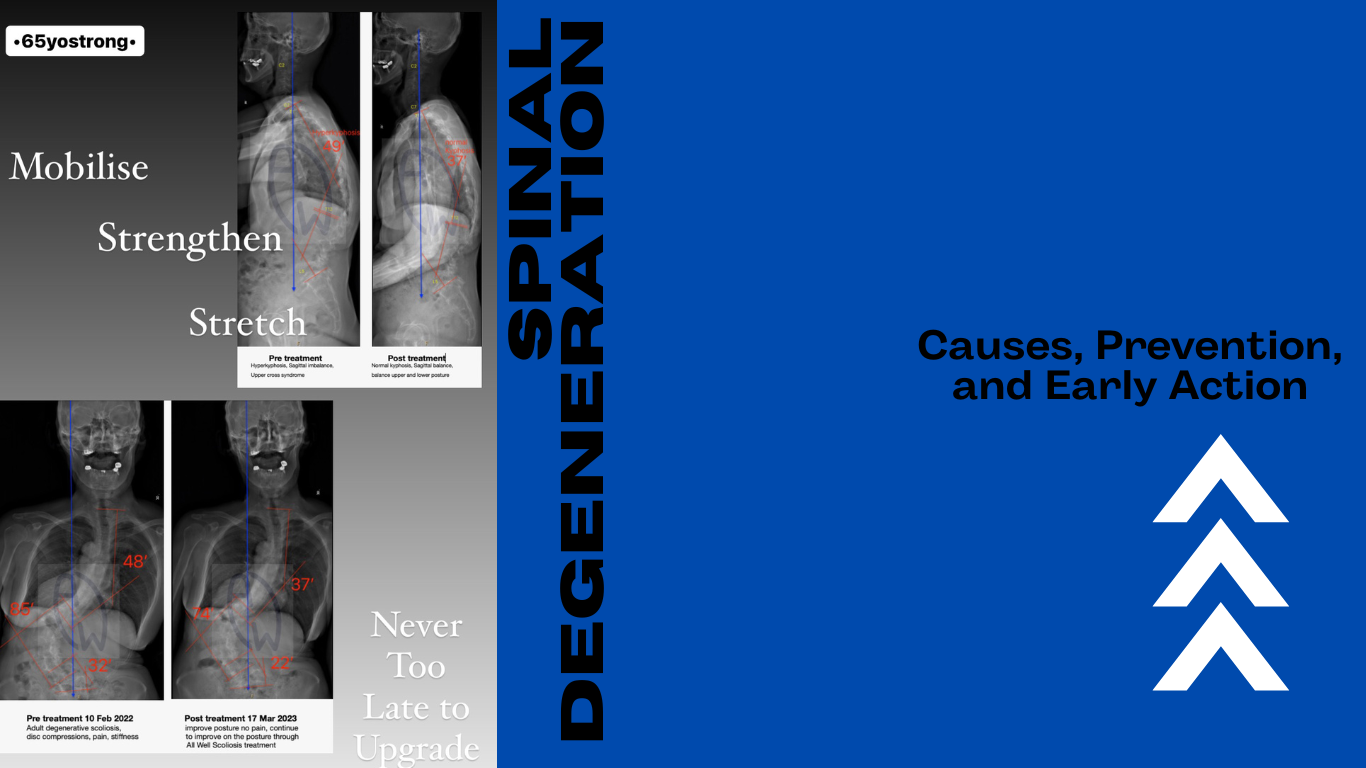
Understanding the Link Between Scoliosis and Spinal Degeneration
Scoliosis — a sideways curvature of the spine — is often thought of as a childhood or teenage condition. However, scoliosis can continue to affect spinal health throughout life, especially if left unmanaged. One major concern as we age is how scoliosis can contribute to spinal degeneration.
At All Well Scoliosis Centre, we believe that with early awareness and targeted care, individuals can maintain strong, healthy spines well into later year.
How Scoliosis Affects the Spine Over Time
In a normal, healthy spine, the vertebrae are stacked vertically to distribute weight evenly.
When scoliosis is present, the spine curves sideways, leading to uneven pressure across joints, discs, and bones.
Over time, this imbalance can cause:
- Faster wearing down of discs (disc degeneration)
- Joint inflammation (facet joint arthritis)
- Narrowing of nerve spaces (spinal stenosis)
- Increased risk of postural collapse and physical limitations
Scoliosis alters the spine’s mechanics, setting the stage for early or accelerated spinal degeneration compared to those with a neutral spinal alignment.
Signs That Scoliosis May Be Causing Degeneration, some early signs to watch for include:
- Increased back pain or stiffness, especially after activity
- Noticeable changes in posture (leaning more to one side)
- Height loss
- Numbness or tingling in the arms or legs
- Reduced endurance for standing or walking
- Recognising these signs early allows for targeted intervention before more serious degeneration develops.
Is All Scoliosis Linked to Degeneration?
Not all scoliosis cases result in spinal degeneration.
Several factors influence the risk, including:
- The severity of the curve (larger curves carry higher risk)
- Whether the scoliosis was managed earlier (e.g., bracing, therapy)
- Lifestyle factors such as posture, activity level, and strength
- Mild scoliosis with good core strength and posture habits may never cause significant issues.
- However, untreated or worsening scoliosis can quietly lead to progressive degeneration if not monitored.
How Posture Correction Supports a Healthier Spine, The good news:
Proactive posture correction and skeletal care can greatly reduce the impact of scoliosis on spinal health. Benefits of a posture correction program include: Rebalancing muscle forces across the spine, Improving joint alignment to reduce uneven wear, Strengthening core and postural muscles for better support. Reducing compensatory strain in hips, knees, and shoulders and by addressing posture and movement early, individuals with scoliosis can minimise degeneration risks and maintain better mobility, strength, and confidence.
You’re Not Alone — Support Is Available! At All Well Scoliosis Centre, we offer personalised posture correction programs tailored to individuals with scoliosis and early signs of degeneration. Our non-invasive approach focuses on strengthening the skeletal system naturally, improving posture, and restoring spinal balance — helping you stay active and resilient at every stage of life. Your spine has incredible potential for strength, not just survival.
Start strengthening it today.
! Book a posture assessment with us and learn how to take proactive care of your spine, no matter your starting point !